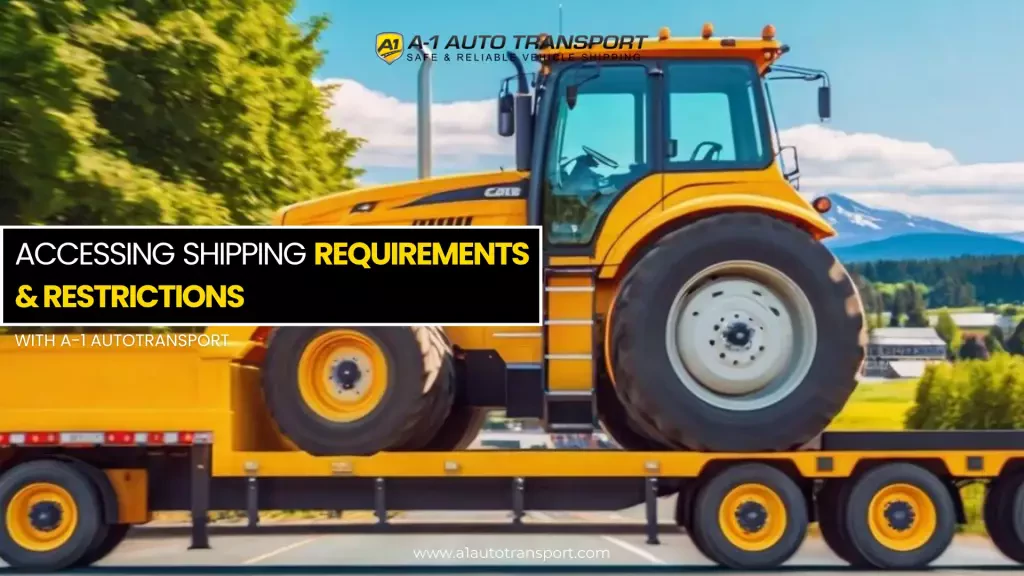
Understanding Heavy Equipment Transport
The global heavy supplies moving industry is valued at approximately $42 million, and more than 95% of weighty shipments are moved by sea. We don't just transport your vehicles; we also assist you with moving any item, ranging from tractors to cranes.
Your machinery is a crucial component of your spreader company's success and represents a significant investment made by your firm. Hence why reliable heavy equipment hauling is very important.
Therefore, it is essential to ensure careful handling during massive materials haulage. Bulky equipment conveyance refers to shifting large instruments and vehicles. This type of load is commonly used in industries like construction, mining, and agriculture.
Below, you will find information about the most commonly moved machinery models in the trucking industry, along with some basic information you will need to get an estimate and tips on how to approach the process.

Examples Of Pricing & Time To Ship
| Shipping To/From | Cost | Distance | Estimated Time In Transit |
| Gilbert to Durham | $3743 | 2139 miles | 6 - 8 days |
| Pittsburgh to Saint Paul | $1507 | 861 miles | 3 - 5 days |
| Newark to Cleveland | $791 | 452 miles | 3 - 5 days |
| Minneapolis to New Orleans | $2137 | 1221 miles | 4 - 6 days |
| Bridgeport to Raleigh | $987 | 564 miles | 3 - 5 days |
| Albuquerque to Atlanta | $2446 | 1398 miles | 4 - 6 days |
| Memphis to Oklahoma City | $815 | 466 miles | 3 - 5 days |
| Seattle to Columbus | $4790 | 2737 miles | 6 - 8 days |
Hauling Near Me
Are you in search of movers in your area? Moving large items requires the expertise of professionals in the heavy equipment transportation industry. Whether you need to transit cargo across the country or overseas, oversized deliveries can be fulfilled to any destination with the help of reliable equipment freight solutions.
General Factors
Weight, dimensions, and regulations are crucial in determining the forwarding method for heavy transport oversized loads.
Various manufacturers and industries rely on heavy machinery services to haul Implements such as farm instruments, tractors, hydraulic forklifts, cranes, bulldozers, industrial tools, engines, construction apparatus, and many other goods. We have recently helped transport different types of apparatus, including those with attachments, both in the United States and overseas.
- Conveyance for Tractor combines & farm materials.
- Backhoes and excavators
- Industrial Apparatus
- Bulldozers haul
- Dump trucks
- Forklifts
- Hydraulic haul
- Engines haul shipment
- Track loaders & graders
- Pile drivers of haul
- Large trucks & vehicles
- Transport vehicle
- Trenchers & scrapers
- Engineering & agricultural tools
Contact Us
We can also move just about anything else. If you have any questions about your conveyance needs, contact us, and we’ll be happy to help you or point you in the direction of someone who can help!
Our Bulky Transit Insurance Policy
Because weighty instruments insurance covers damage to the materials during conveyance, asking customer support about our insurance policies for hauling are asking about insurance. Whether you work directly with a broker or the carrier, you should ensure the carrier's tools insurance covers any potential damage to your hefty tools during transit. It's also essential for you to understand how damage claims are handled.
For such information, you will have to communicate with the carrier directly. If you are working with a broker, be sure the broker carefully selects carriers with adequate equipment insurance coverage and adequately handles damage claims.
Whether you hire us to transport your oversized cargo as a carrier or a broker, we can assure you that the insurance coverage will be adequate to cover any damage to your rigs during conveyance. Furthermore, we ensure that should you need to submit a damage claim; we will assist you at every step and ensure your claim is handled promptly and correctly!
Hire Reliable Hauling Solutions Near Me
Oversized equipment moves may involve securing necessary permits, coordinating logistics with logistics agents, cargo insurance, special handling and ensuring compliance with local laws and regulations. Finding a reliable and safe apparatus moving firm is essential if you require a haul.
Search for "Heavy Machinery Hauling near me" on Google to find one. This will help you locate companies specializing in secure cargo using specialized trailers such as step-deckor flatbed trailers using the right trailer for your heavy load.

Best Fit
You can read reviews from other customers to determine which firm best fits your needs. This will give you an idea of the transportation company or transportation services reputation, experience, pricing, and more. Once you have a list of potential load carriers, you can contact them and ask questions about their products, pricing, and freight insurance.
Professional heavy apparatus movers will explain all your options, including container sizes and insurance information, and provide free quotes for moving your instrument. Some firms even have online calculators that can give fast estimates based on rates per mile, weight, and size.
Fortunately, the price for hauling machinery is known as cost-efficient, and you can expect to receive competitive pricing from reputable businesses.
Why Use Us?
The worry of complying with state requirements will be removed if you have a reliable and trustworthy conveyance enterprise like A1 Auto Transport. This covers the paperwork required to obtain the licenses to send big loads. A reputable conveyance firm like A1 Auto Freight will complete the forwarding procedure from pick-up to delivery.
This kind of arrangement is essential to the success of your project. We will also take care of the legalities and obtain your required permits. In addition, you will have more time to concentrate on other crucial matters because you will know that your priceless item is in the capable hands of shifting professionals.
Benefits Of Us
- Removes The Initial Cost Of Buying Delivery Trucks:
In the long run, you may save a lot of time and money by employing a hauling business like A1 auto freight, as they promise that all maintenance and repair costs will be covered.
- A Company That Transports And Drives Has Greater Experience
Well-known hauling businesses like ours employ drivers with extensive training and expertise who are familiar with transmitting nuances. They will evaluate the options and select the fastest, safest, and best routes to ensure your cargo arrives at its destination on schedule and in good condition.
- Obtaining Escorts and Trucking Permits Is No Longer Your Issue
Permits and paperwork won't be an issue if you decide to work with A1 Auto Carriage. It could be challenging to determine for yourself whether or not your burden is oversized. Fortunately, we will assist you in determining its size and choosing the appropriate trailer, as we are the top shipping company. Our skilled logisticians will assist you in obtaining the escort cars required for safe and authorized transit if your load is more extensive than usual.
Some Reputable Manufacturers Include:
- Caterpillar
- Case
- Bobcat
- Chevrolet
- Komatsu
- Massey Ferguson
- Kubota
- Isuzu
Texas, Hawaii, California, Florida, and New York are central U.S. states with ports that accept and handle these oversized loads. It takes specialized towing equipment, state-of-the-art carriers, and haulers to get large cargo containers from movers to their destinations.
What Is Considered To Be Gadgetry?
Heavy machinery is a broad term that refers to a wide range of devices used in various industries. This gear is defined by both its weight and size. Some common examples include:
- Tractors
- Forklifts
- Cranes
- Industrial
Machines in this category may require specialty carriers instead of traditional flatbeds. Fortunately, we can facilitate your moving needs by connecting you with one of our reputable kit movers near you.
Cost And Time To Move Examples - How Much Does It Cost?
| Distance | Cost | Estimated Time In Transit |
| 0-200 miles | $4.00 - $5.00 per mile | 1-3 days |
| 200-500 miles | $3.50 - $4.00 per mile | 2-4 days |
| 500-1000 miles | $3.00 - $3.50 per mile | 3-6 days |
| 1000-1500 miles | $2.50 - $3.00 per mile | 4-7 days |
| 1500 - 2000 miles | $2.00 - $2.50 per mile | 5-8 days |
| 2000 - 2500 miles | $1.50 - $2.00 per mile | 6-9 days |
| 2500+ miles | $1.00 - $1.50 per mile | 7-10 days |
*Prices and times for large transport are estimated. They can vary depending on the season and the supplies you transmit. Get your provider a load and easy dispatching estimate using the form above and transport heavy equipment or industrial equipment with proper loading and careful planning today.
You can give us your email address and we will provide a real-time quote for overweight loads.
The Influence Of Size And Weight For Freight Shifting
Remember that the size and weight of your implements are the primary factors determining the overall shipment cost. Due to dimensional constraints, some materials may need to be disassembled before the movers load and unload them.
Additionally, the size and weight of your instruments may affect the hauling options available for overseas destinations. If you're dispatched overseas, a transit method for lift-on, lift-off tools may be more suitable than a flatbed truck.
You can find more information on shifting options and a guide to finding the weight of construction supplies in the resources section at the bottom of the page.
If you have any questions about a load, need guidance, or would like a cost estimate for cargo, don't hesitate to contact us today or use a quote calculator to get an estimate instantly.
We offer peace of mind, oversized load permits, fast delivery times, many load options, and the lowest rates for your instrument delivery needs.

Accessing Dispatching Requirements And Restrictions
Two key ingredients to a positive experience are expertise on behalf of the haulage company doing the work and assurance that you’re in good hands even if accidents occur.

Relocating Insurance
It should be pointed out that oversized loads often come with a higher cost than regular loads, but they are a crucial part of many businesses.
Suppose you must move gear, construction materials, or other large machinery items in potentially challenging weather conditions. In that case, working with reputable transport providers specializing in this service type with best practices is essential. These haulers are required by law to have a certain level of insurance to ensure the safety measures of their items are properly planned for.
While it can be challenging to find this information online, most haulers will be happy to provide it if you ask.
Additionally, the hauling contract typically includes insurance coverage as well.
The Expertise Of Your Assistance Provider
Having expertise is crucial when in the business of hauling oversized items. It requires attention to detail and the appropriate experience of qualified transport specialist service providers.
For instance, a shipper which higher risk assessment who frequently moves combines or other machinery across the state using a step-deck or other special trailers may not be the right equipment option if you must transport a heavyweight skid steer long-distance to Canada or across the country.
Repositioning Regulations In The U.S.
In the U.S., the Environmental Protection Agency and Customs and Border Protection have their requirements for oversized item shifters regarding emissions, documentation, fees, import, and export.
Consult with government websites or your service provider if you’re curious about the details, but the most reputable dispatchers will handle these matters.

Choosing The Right Delivery Firm
Depending on your destination, various professional service options are available if you need to haul oversized loads or a different heavy equipment shipment. Not all oversized load trucking solutions offer the same options, but you can move your cargo by aircraft, heavy-lift ships, flatbed trucks or trailers, or containers.
Many services offer different options to suit your needs. It's essential to consider the moving machinery type and whether it requires special care or hauling instruments. Don't hesitate to ask haul trucking companies if they offer any unique benefits.

Things To Consider Before Arriving Movers
On the day of your scheduled movers' arrival, ensure the area is clutter-free for the loaders. They'll need adequate spaces to work safely and ensure maximum performance. Providing the movers with this security and clearance is worth spending time on.
Once the shipment leaves your property, it is protected by insurance held by the freight hauling company as it makes its way to its destination.
The movers can transfer your load to another hauler during the trip.
Overseas Hauling Methods
Roll-On/Roll-Off – The RoRo method is a popular form of materials relocation delivery made to a country overseas. A flatbed hauls vehicles such as motorhomes and industrial machinery. Remember that there are some height and weight restrictions on this method.
Flat Rack Heavy Haulers – This haulage method delivers boats, RVs, and other items on a flat rack secured to a relocate.
This open-air method is favorable due to its cheaper best deal rates and ability to dispatch a broader range of cargo.
Container – This option is ideal for transmitting gadgetry when your cargo can fit into a large movement container. It offers your gadgetry more protection against weather conditions.
Lift-On/Lift-Off – The LoLo method is best used for inoperable vehicles, engines, farm materials, and other tools. A crane lifts your cargo onto a shift to move the oversized load.

Things To Know Before You Transit

Generally, transporting machinery is a smooth and efficient process. With that being said, there are a few things you need to know when arranging your freight shipping services. These include:
Dimensions For Conveyance
It is essential to have precise measurements of your heavy hauler's freight. Our team requires this information to assist you in arranging your transit services. Inaccurate measurements can lead to expensive delays and oversized loads.
If you are uncertain about how to measure your machinery, please do not hesitate to contact us for assistance.
Required Haulers Loading Cargo
Does your oversized load require any specialized loading? If so, make sure to discuss this with our team in advance. This allows us to pass that information on to the carrier and avoid any issues with your machinery order before pickup.
Permitting Move Regulations
You will need special permits to move your apparatus to another country. Oversized equipment that exceeds the specified weight of the equipment limits will also require permits for oversized loads for fleet management and state regulations.
Failure to obtain these permits in advance may result in delivery delays or affect the pricing for cargo freight insurance.
How To Prepare For The Hauler Load
Here are a few tips for you to make sure you are ready for the hauler load:
- Please ensure your unit is ready to be loaded onto the truck when the driver arrives. This includes retracting booms and positioning your delivery to fit safely on the flatbed.
- Depending on where you want to dispatch the unit, you may also need to remove the scoop or bucket. Some states have made it illegal to move your shipment with a scoop or bucket attached.
- It is essential to cover the exhaust stack to prevent unwanted debris from entering and damaging it. Additionally, disconnect the battery to prevent it from being drained if lights or other components are accidentally turned on during conveyance.
- Before moving your apparatus, make sure that all doors are secured. If they are not, they could catch the wind and become damaged during cargo.
- Lastly, it is recommended that your cargo is washed. Dirt and debris can obscure tie-down points and make it challenging to inspect if it is foul.
Types Of Cargo
|
|
Relevant Statistics
- The global weighty equipment Freight industry is estimated to be worth over $150 billion.
- Approximately 80% of oversized instrument loads are done via sea freight.
- On average, more than 7,500 units are dispatched internationally every month.
- The United States accounts for approximately 30% of the global demand for hefty implements relocating assistance.
- Over 90% of sturdy implements freight involve construction apparatus such as excavators, bulldozers, and cranes.
General Facts
- Heavy shipping involves the forwarding of large and bulky tools or vehicles.
- Specialized trailers and carriers are used to haul safely.
- Due to weight and size restrictions, the cargo process may require permits and coordination with local authorities.
- Freight forwarders and logistics companies often handle dense materials conveyance, ensuring efficient delivery.
- Proper planning, extra time and packing and securing of oversized loads is crucial to prevent damage during the transport process and meet legal requirements.
Resources
Freight Shipping Resource
Construction Equipment Specs & Weight - helpful for construction companies specific requirements when it comes to gross vehicle weight, weight loads, fuel consumption and federal regulations.
If you need to know how much a specific piece of apparatus weighs, that is valuable information for getting a free quote estimate for supplies dispatching.
Frequently Asked Questions
How much does heavy equipment transport cost?
The cost of shipping heavy equipment typically ranges from $2 to $5 per mile, depending on the total distance, equipment size, and service type. Short local hauls cost more per mile, while cross-country routes average less. Prices can also fluctuate based on route permits, fuel rates, and carrier availability. To get a precise figure, visit our car shipping cost guideor request a detailed quote through our heavy equipment transport service page.
What is the Roll-On/Roll-Off (RoRo) method?
Roll-On/Roll-Off transport allows self-propelled machinery to be driven directly onto a vessel or trailer for shipment and rolled off at its destination. It’s an efficient and cost-effective solution for wheeled or tracked equipment. RoRo is widely used for both domestic and overseas shipments. For details on international applications, visit our roll-on/roll-off RoRo shipping guide.
How does the Lift-On/Lift-Off (LoLo) method work?
The Lift-On/Lift-Off method is used for non-operational or oversized equipment that cannot be rolled onto a carrier. Cranes or hydraulic lifts load and unload the machinery at each port or terminal. This method is ideal for items such as generators, farm machinery, or large engines that need precision handling. For similar transport types, explore our crane shipping service.
What is a flat rack container, and when is it used?
A flat rack container is a steel platform with end walls designed for shipping oversized cargo that cannot fit into standard containers. This method provides flexibility for shipping boats, RVs, or large machinery, but does not protect against weather exposure. It’s a popular option for cost-efficient domestic transport and short-sea shipping.
Who provides insurance coverage during heavy equipment transport?
Licensed carriers are required by the Federal Motor Carrier Safety Administration (FMCSA) to maintain both cargo and liability insurance. When booking through A-1 Auto Transport, your shipment is automatically protected by our carrier network’s coverage, and you may purchase additional insurance for higher-value machinery. Learn more about protection options in our door-to-door transport service overview.
Are there weight or size restrictions for heavy equipment shipments?
Yes. Standard trucks can haul up to 80,000 pounds gross vehicle weight (GVW) before special permits are needed. Oversized dimensions, typically over 8.5 feet wide or 13.5 feet tall—require additional route planning, pilot cars, and state permits. For multi-state projects, review our heavy haul regulations guide to plan compliant transport.
Can I track my heavy equipment during transport?
Yes, most carriers now offer real-time GPS tracking, allowing customers to monitor progress and estimated delivery windows from any device. Tracking enhances transparency and provides peace of mind for valuable equipment in transit.
What happens if my equipment needs to be moved across state lines and requires oversize or overweight permits?
When your equipment qualifies as oversized or overweight, it simply means a few extra steps are needed before transport but it’s nothing to worry about. Our logistics team takes care of all the required state and federal permits, as well as route planning to make sure your load stays compliant and safe every mile of the trip.
Different states have their own size and weight limits, so our specialists review each route carefully and secure the proper documentation ahead of time. If the shipment needs pilot cars, route surveys, or special timing, we arrange those details for you.
The goal is to make the move as smooth as possible, you won’t need to handle any of the paperwork or regulations yourself. Once everything is set, we’ll keep you updated on pickup, transit, and delivery so you always know where your equipment is and when it will arrive.
How do you handle moving heavy equipment if the site has limited access or requires special permits?
For jobs where the pickup or delivery site has restricted access, uneven terrain, or requires oversized or overweight permits, our team takes extra steps to make sure everything goes smoothly. We begin by gathering detailed information about the equipment’s size and weight, the condition of the access roads, and any local permit requirements. Then we select a carrier that is licensed and experienced with these kinds of moves.
If a route requires pilot cars, bridge inspections, or travel during specific hours, we handle the scheduling and coordination ahead of time. On the day of transport, the crew uses heavy-duty tie-downs, chassis supports, and protective equipment to stabilize the load and safeguard against shifting. After delivery, we conduct an inspection and document the equipment’s condition for your records.
By planning for access challenges and permit needs in advance, we help ensure your heavy equipment is moved safely and without surprise delays.
How do I know if my equipment needs an escort or oversized load permit for heavy equipment transport?
Whether your equipment needs an escort vehicle or an oversized load permit depends on the size, weight, and route of the shipment. Many states specify a width above a certain number of feet (commonly 8, 6 inches), a height over a standard limit or a weight that requires special routing. When your equipment meets or exceeds those thresholds, the carrier must arrange the appropriate permit and may schedule an escort or pilot car to safely guide the transport.
When you request a quote, be sure to provide the exact width, height, length and weight of the machinery. Also mention if it has attachments or overhangs that could add to its footprint. With this information we can verify whether permits or escorts are required and include those costs in your estimate. This upfront planning helps avoid route delays, surprise fees and ensures your equipment arrives without issues.
What specific steps must I take before my equipment is loaded onto the trailer for heavy equipment transport?
Before your equipment is loaded we’ll guide you through a detailed checklist so everything goes smoothly on pickup day. First you’ll want to clean the equipment and remove any loose parts such as buckets, booms, or hammers. This helps prevent damage and avoids delays during inspection.
Next you’ll provide accurate dimensions and weight including any attachments or modifications so the right trailer and permits can be arranged. If your unit is non-running or requires winching, we’ll schedule additional equipment and manpower in advance. Your site must be accessible to the carrier’s truck with firm, level ground and no overhead obstructions or tight turns.
Finally we’ll document the condition of the equipment with photos from multiple angles and note any existing wear or damage. Being prepared with these steps means your shipment is scheduled properly, reduces risk of last-minute costs, and ensures your machinery arrives safely and on time.




 Share on Facebook
Share on Facebook Share on LinkedIn
Share on LinkedIn Share on Twitter
Share on Twitter Google
Google  Instagram
Instagram 



